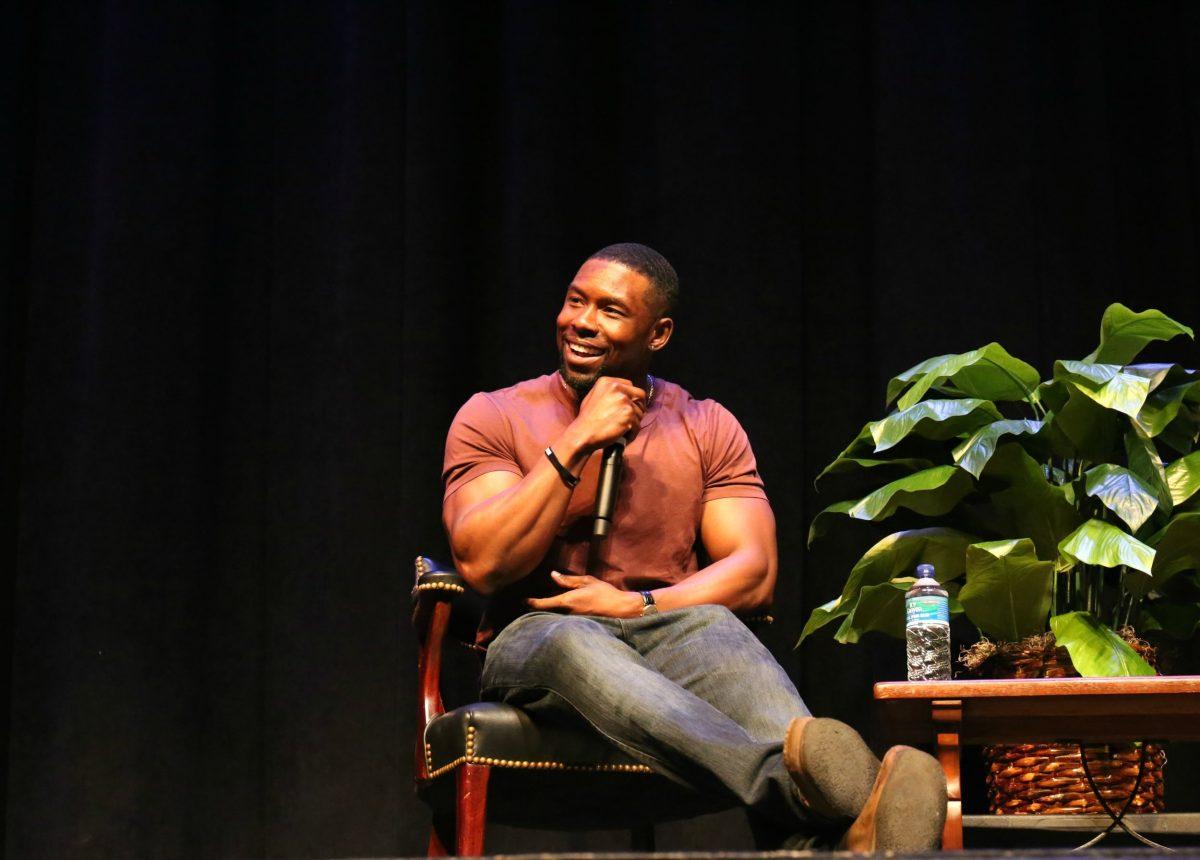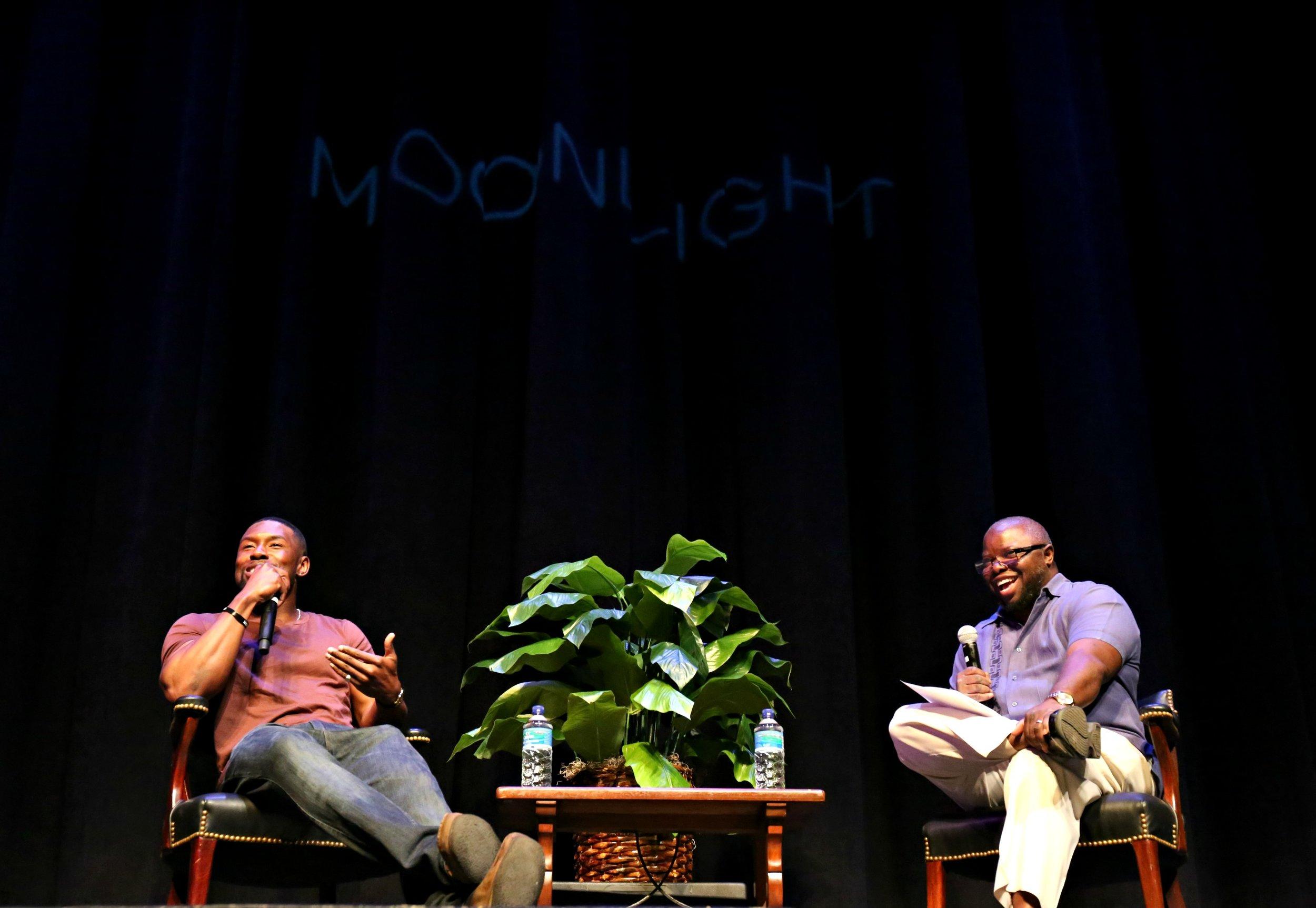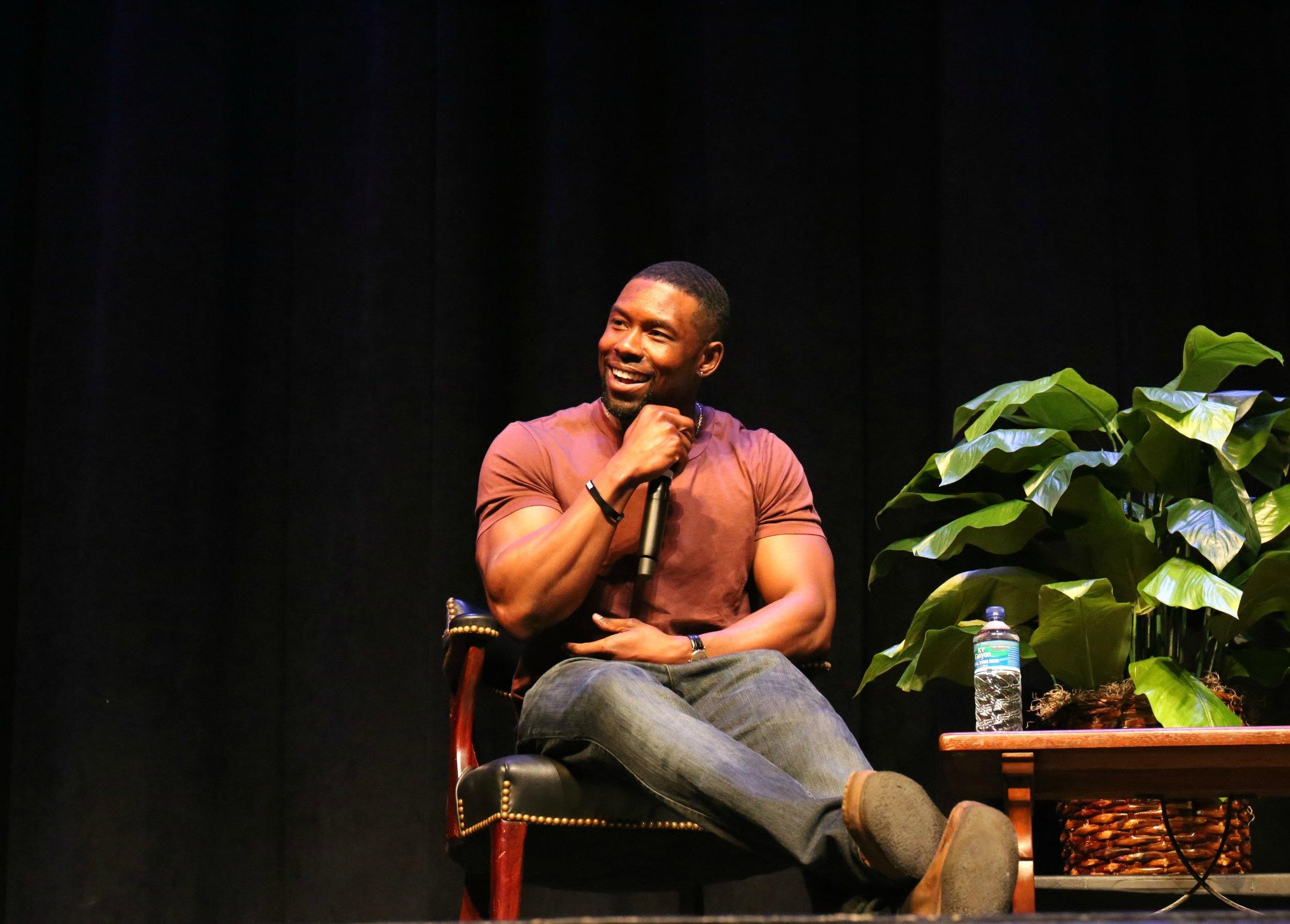Rhodes and Dr. Richardson discuss the film.
When Trevante Rhodes first read the script for “Moonlight,” he said he never read anything that beautiful.“I read it immediately before we got to the third chapter, and I knew everything about the person—and that doesn’t happen that often when you read a script,” Rhodes said. “So, I had to tell the story, I had to be a part of it because I know people in my life who went through these particular traumatizing moments.”
Story by Urub Khawaja
Photos by Mary Elizabeth Pistorius
Rhodes, lead actor of “Moonlight” and University of Texas at Austin alum, visited campus on Thursday, Feb. 16 to host a fireside chat with Dr. Matthew Richardson, Associate Professor of English and African Diaspora Studies. The event was co-sponsored by Campus Events and Entertainment, the largest student-run event planning organization on campus, and MasculinUT, an initiative started by Voices Against Violence that aims to celebrate healthy forms of masculinity. The event began with a screening of “Moonlight” and ended with Rhodes’ interview. The chat covered topics such as his role in the film, black identity, queer identity and masculinity in film and society.
After seeing “Moonlight,” MasculinUT decided to approach E+E last December to see if Rhodes could visit campus to discuss the themes of the film. E+E initially only had a screening set up for the film on campus, but together the organizations managed to have Rhodes attend the event as well. “We were so struck by the intersections present in the film—this film really speaks to what we’re thinking about right now,” Voices Against Violence prevention and outreach specialist, Lauren White said. “We thought that it would be so awesome if we could bring him here to talk about these things. We want to provide a larger platform to explore identities that really get marginalized and are not given this large of a platform.”
“Moonlight,” directed by Barry Jenkins, was released in October 2016 and is currently nominated for 8 Academy Awards. The film is divided into three segments and follows Chiron, played by Trevante Rhodes, Ashton Sanders and Alex R. Hibbert, through his arduous journey of masculinity and sexuality in an African American community in Miami. The film contains a captivating storyline and beautiful predominantly blue visuals. It was awarded a Golden Globe for Best Motion Picture in Drama.
Rhodes’ character Chiron discovers that he might be gay in the first chapter of the movie during a discussion with Juan, played by Mahershala Ali. Throughout the film, he starts to come to terms with his sexuality and his version of masculinity, which was looked down upon by other characters in the movie since it did not fit society’s standards of a what a black man should be. “I think [Chiron] wholeheartedly understands he’s gay,” Rhodes said. “I think the reason why you don’t hear the word ‘gay’ so much in the film is because in that first moment with Mahershala’s character and Alex—Little—I think Barry wanted to keep it and the word and the understanding of what it means to be gay so potent and leave it to that one moment.”
Ali’s character was a father figure to Chiron in the movie, but his character died during the second chapter of the film. This happened because the director wanted to portray the reality of African American children who live in projects like the one depicted in the film. “Barry wanted this to be an immersive film,” Rhodes said. “He wanted you to feel the same sensation that these kids feel whenever these influences are just taken out of their lives,” Rhodes said.
Rhodes discusses the impact of the film.
Chiron’s character is shown to have one relationship in the movie, with his old companion Kevin, who is played by André Holland, Jharrel Jerome and Jaden Piner. “I think that’s also because he found his 10,” Rhodes said. “If you rate on a scale of one to 10, most of us settle for like sixes and sevens. But yeah, I think that’s why he hasn’t been with anyone else because he found his 10 at an early age.”
Growing up, Rhodes could relate to Chiron’s character, because he too felt the need to maintain an image or have a certain level of intellect in order to be accepted by others. He added that if there’s one person who should accept you, it should be your mother. He then pointed out his mother who was sitting in the front row of the audience. “I was also gifted with a mother who raised us to understand that you are yourself and being true to yourself is the most important thing,” Rhodes said.“And having the opportunity to be in the film amplified that.”
Some students, such as freshman radiation physics major Nicolle Walters, believe that this film provides a different portrayal of the gay man usually seen in movies. “In most of the movies I’ve seen with a gay black male—he’s very flamboyant or something, but they rarely show a different side with a masculine man who just is gay,” Walters said. “I feel like a lot of movies who depict guys who are gay tend to use their sexuality as their main characteristic.”
Abigail Onwunali, junior human development and family sciences major, said that the movie was very important to her and the black community altogether. “A movie has never come out this big before, you know?” Onwunali said. “For an African American male to show—for us to see his pain—because everybody thinks that the African American man is macho and strong, and that he doesn’t cry and he doesn’t shed tears, but they all go through pain, similarly.”
“Moonlight” was also a really poignant film for Alexis George, undergraduate program coordinator in the School of Social Work. Rhodes’ role reminded her of a lot of people she knew. George believes that this film should be a required viewing for a lot of people. “There’s just so many different intersectionalities to this film, and I feel like it’s really important for a lot of different people to see,” George said. “It’s a beautiful film and there’s so much—there’s pain, but there’s love, and there’s growth and there’s acceptance. It’s just wonderful—I can’t even begin to describe how wonderful it is.”
One of Rhodes’ main messages to his audience was the significance of self-love. He said that in order to break barriers that cause aggressive masculinity and homophobia, it is important that we ask questions and develop an understanding above all things. “It baffles me how people could brandish one another because like, ‘oh, my skin’s darker than yours,’ or ‘oh, I’m shorter than you,’ or ‘oh, I love people of the same sex,’ Rhodes said. “It’s dumb to me. We’re literally all the same—blood, skin, bones—all the same. So developing an understanding is the first thing we need to do. And again, just loving everybody because of it—it’s like loving your brothers, loving your sisters.”














































RN • Apr 16, 2017 at 9:18 am
Would have been nice to see the the vid of this discussion! 😀